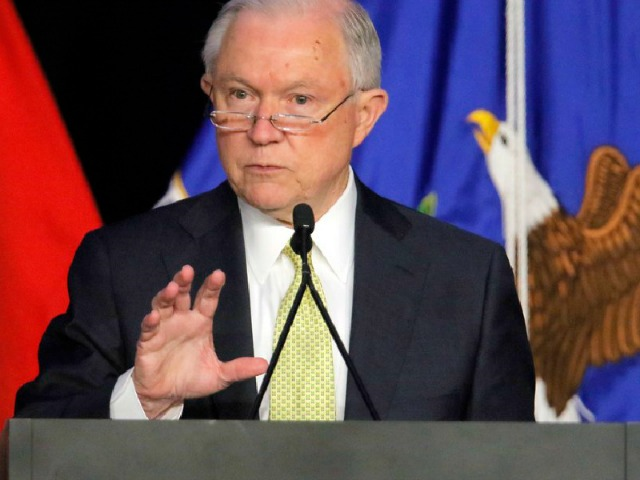Attorney General Jeff Sessions addressed the 2017 Department of Justice Hate Crimes Summit in Washington Thursday.
The meeting of law enforcement and DOJ officials came after the release Wednesday of a comprehensive report on hate crime victimization from 2004 to 2015.
“No person should have to fear being attack because of who they are, what they believe, or how they worship,” the attorney general told the room after an introduction from recently confirmed Associate Attorney General Rachel Brand.
“So I pledge to you, as long as I’m attorney general of this Department of Justice, we will continue to protect the civil rights of all American, and we will not tolerate the targeting of any community in our country,” Sessions continued.
The speech touted the creation of a subcommittee to address hate crimes in America:
I asked Tom Wheeler to serve as chairman of the task force’s hate crimes subcommittee, which includes representatives from our U.S. Attorney community, the DOJ Community Relations Service, the FBI, the Community Oriented Policing Office, Office of Justice Programs, Office of Victims of Crime, and the Criminal Division.
Federal “hate crime” laws aroused controversy since their first enactment in 1994. Since then, various violent and non-violent offenses can be given much stiffer penalties when the perpetrators are shown to have committed them “because of the actual or perceived race, color, religion, or national origin of any person.” In 2009, President Barack Obama, to the adulation of his base and over the opposition of then-Senator Jeff Sessions, expanded the definition to crimes motivated by “gender, sexual orientation, and gender identity.”
In the Trump era, the controversy has taken on a new significance as the political left has attempted to paint Sessions as racist, anti-homosexual, or otherwise unfit to protect all Americans as head of the Justice Department. During Sessions’s confirmation hearings for attorney general Sen. Diane Feinstein cited his vote against expanding hate crime definitions as a concern.
Despite a record of applying the law to protect Americans of many backgrounds, the prospect of lax hate crime enforcement has played a central role in the effort to undermine Sessions’s legitimacy. Feinstein followed up her concerns over Sessions’s vote on expanding hate crime definitions with the admonition that an attorney general must enforce even laws he voted against. Sessions’s record on hate crime enforcement demonstrates his willingness to do that.
Since the beginning of Sessions’s tenure at DOJ hate crime laws have, in fact, been vigorously used to seek the most serious readily provable offenses against a multitude of defendants, as is Sessions’s official policy for the Department. Last week, for example, 25-year old Texan Marq Vincent Perez was charged with federal hate crimes that may net him up to 30 years in prison after he started a fire at an Islamic center.
Californian Justin Whittington, also 25, will serve 15 years hard time after being sentenced in April for firing a shotgun out of a car window and shouting for Latinos and Middle Easterners to leave his town. Perhaps most notably, in the first federal hate crimes case ever based on the victim being “transgender,” a Mississippi man was sentenced in May to 49 years in prison.
The media has constantly hammered a narrative of an explosion of such crimes in the aftermath of President Donald Trump’s ascent to the top of American politics. As has been the case since the beginning of the hate crime concept, the most celebrated examples have often proven to be complete fabrications. An undoubted explosion since Trump’s election has been the volume of these hoaxes.
In December, a tale of a Muslim student having her hijab stolen by drunk and ranting Trump supporters was picked up across the mainstream media, despite never having happened. In May, a widely reported “KKK or Nazi” church vandalism, with the terms “Heil Trump” and “Fag Church,” turned out to be performed by the liberal church’s organist.
The most serious pattern of hate crimes since Trump’s election was the dozens of threats against Jewish community centers across the country. Rather than Trump supporters, one of the perpetrators is alleged to be a Bernie-supporting fake-news journalist who was fired from the Intercept for being a fabulist, and another a Jewish American teenager living in Israel.
The truth of a hate crime explosion is not entirely settled by this week’s Bureau of Justice Statistics report, which runs only 2004 through 2015. In that time, however, reported and estimated unreported hate crime rates remain virtually unchanged. The study, which includes estimates of hate crimes at the federal and state level, did, however, make findings which may conflict with the prevailing media narrative.
From 2011-2015, for example, 53.4 percent of the victims of hate crimes were non-Hispanic whites. The rate of hate crimes in the much-maligned South was 0.4 per 100,000 residents, far and away the lowest in the nation. Meanwhile, the West of the country, including diverse and “progressive” California, had a rate four times that, at 1.6 per 100,000 residents.

COMMENTS
Please let us know if you're having issues with commenting.